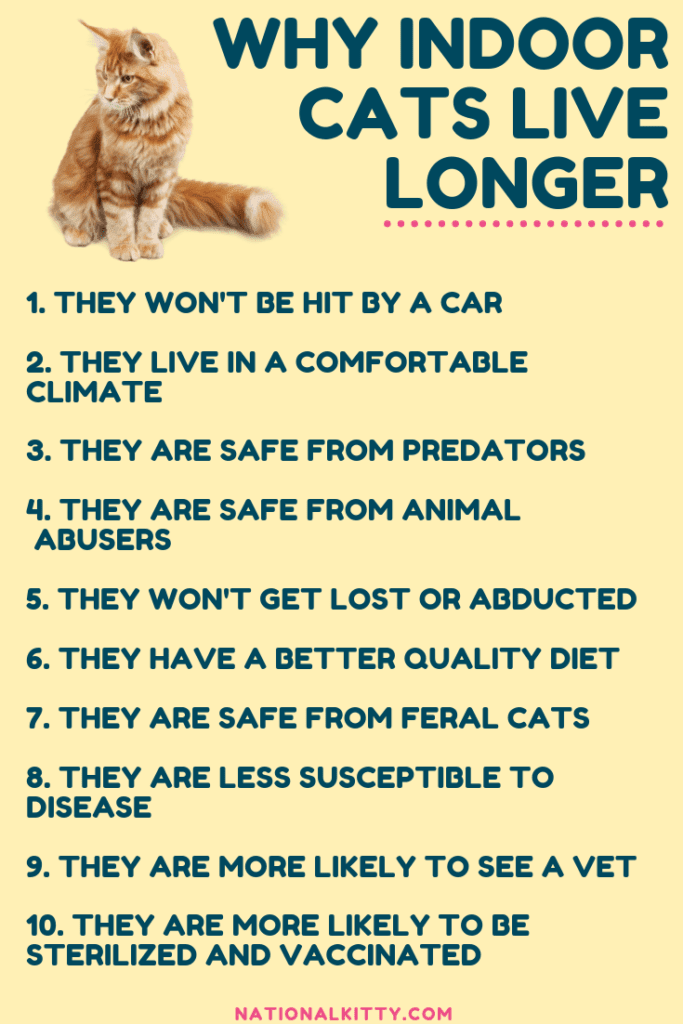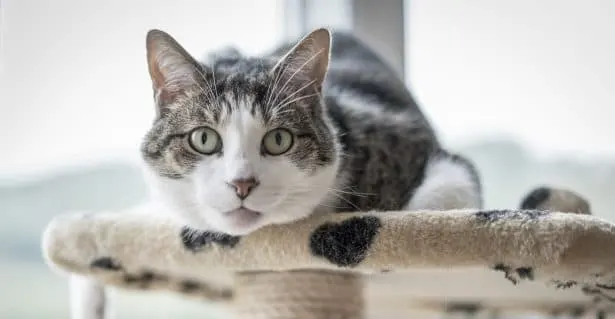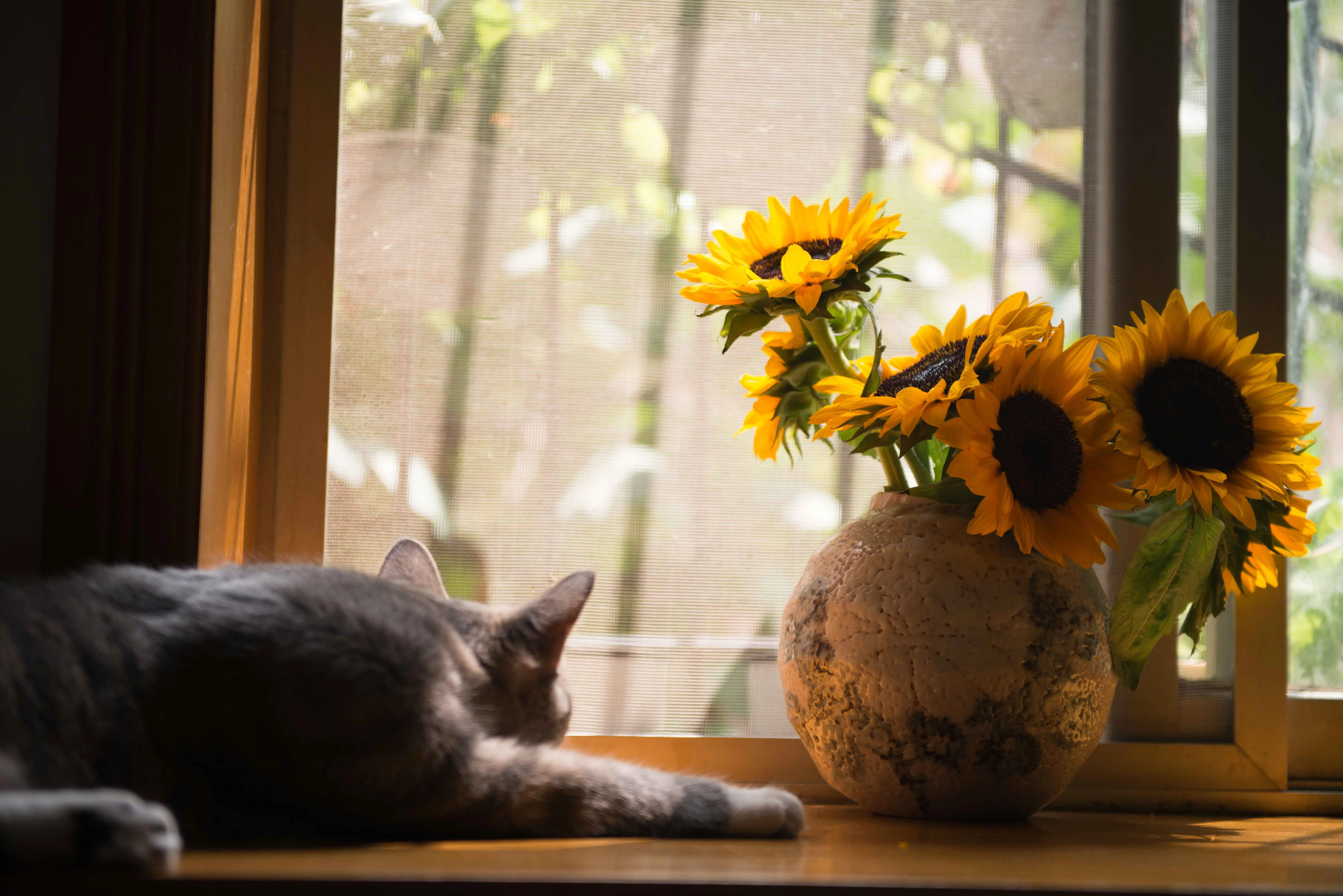You have probably heard that indoor cats tend to live longer than outdoor cats. We can now confirm that this is true (by an alarming number), but did you ever wonder why?
Read on to find out some of the reasons why indoor cats live longer than outdoor cats.
There isn’t just one reason why indoor cats live longer. Scientists believe that it’s a combination of factors: Breed, environment, diet, maintenance, and whether the cat has been spayed or neutered.
On average, indoor cats live almost three times as long as outdoor cats. According to this study, the average age of an indoor cat is about 14 years old, while the average age of an outdoor cat is just under 6 years old.
That’s a big difference. The numbers don’t lie!
The Dangers of Outdoor Life
Some cat owners have indoor/outdoor cats. They let their kitty roam outside during the day and make sure the cat is safely indoors at night. While you may think you’re indulging kitty’s wild side by letting your cat outside, the risks are more dangerous than you think.
11 Reasons Indoor Cats Live Longer than Outside Cats
1. Indoor cats avoid traffic.If you live in an urban area, traffic can be a danger to your cat. In a busy area, it’s easier for a cat to get hit by a car.
This is still a danger in suburban areas where cats are at risk of being hit by neighbors.
2. Indoor cats avoid predators: If you live in a more rural area, the primary concern may be other predatory wild life. Your cat won’t stand a chance against a wild animal like a fox or a coyote.
3. Indoor cats have a controlled climate: Climate is huge overlooked factor. If you live in an area that has very hot summers or very cold winters, you put your cat at risk of overheating or freezing to death.
4. Indoor cats avoid animal abusers: Some people can be very cruel to cats. If people see cats as nuisances, they may hurt them or try to poison them by leaving antifreeze in a dish for them to drink.
Dog fighters have also been known to abduct cats and kittens to use as bait.
5. Indoor cats avoid getting lost or picked up: There’s always a risk that your cat gets lost and can’t make its way back home.
In the event this happens, your cat needs to be equipped with a collar and ID tag to help anyone who finds him/her get back home.
Microchipping is also crucial. If your cat cannot be identified, animal control could pick up your cat and take it to the local pound or shelter where it will face the risk of euthanasia.
6. Indoor cats avoid starvation and have a better diet. If kitty is outside, he/she is not getting your well-balanced cat food.
While some people may think letting them eat the “natural way” is healthier, this is not the case.
Cats that are not being fed by humans are likely hunting small animals or scavenging, both of which can lead to exposure to parasites, fleas, ticks, and diseases. Cats are much better off with nutrient balanced cat food.
7. Indoor cats avoid other neighborhood cats: You need to consider how many of your neighbors have outdoor cats.
As you probably know, cats are territorial, and if your cat encounters a neighbor cat outside, there will likely be a scuffle.
8. Indoor cats avoid feral cats: No matter where you live, there is always the chance of your outside cat encountering a feral cat.
These encounters are seldom peaceful, so your cat is at increased risk of injury from other cats (or any animal) when they’re outdoors.
9. Indoor cats are much less susceptible to disease. If your cat does get injured outdoors, they’re at a greater risk of infection or contracting a disease from another animal.
Feral cats could transmit life threatening diseases like FIV and Feline Leukemia. Plus, indoor cats don’t have to worry about fleas and ticks.
SURVEY: Do You Consider Cats Family?
Your opinion matters!
10. Indoor cats are more likely to see a vet. If your cat lives indoors, you are more likely to notice subtle changes in mood, behavior, appetite, or physical appearance.
These subtle changes may be the first indicators of disease, in which case you are readily available to take them to a vet.
If your cat is outdoors and gets sick or hurt, there’s nobody there to help it. If they can’t make it home to you, they are left weak and at greater risk to be attacked by predators.
In addition, cats hide and seclude themselves when they are sick and injured.
An injured or sick cat is less likely to return home. To prevent a tragic incident like this, keep your cat indoors.
11. Indoor cats are often spayed/neutered and up to date on shots: Cats that are sterilized are at a lower risk for developing diseases of the reproductive system later in life.
Cat owners who choose to keep their cats indoors are more motivated to spay/neuter their cat.

Alternatives to going outside
While some may argue that you’re depriving your kitty from their natural habitat if you keep them inside, a lot of cats are perfectly stimulated by having a view of the outdoors.
These alternatives will keep your cat satisfied and stimulated. And more importantly, safer!
Window Views: Create a space for your cat to sit by a window and sunbathe. Cats also enjoy looking out the window and chattering at birds.
Catios: It’s like a patio but for cats! These are closed in outdoor spaces that your cat can enjoy without the usual outdoor risks.
Plants: Consider getting some cat grass or a cat nip plant to give your kitty a little taste of the wild.
However, exercise great caution when it comes to exposing your cat to certain plants. Many of them are poisonous. These plants are poisonous to cats and should be avoided.
How to Ensure Your Indoor Cat Gets Exercise
While your cat is much safer inside, both from other animals and the elements, indoor cats don’t get the exercise and stimulation that outdoor cats get.
It’s up to us to make sure that kitty doesn’t just lie around and get fat. You should try to play or interact with your cat at least once a day.
The exercise is good for them, and games are good for keeping them from getting bored.
Conclusion
Below is a summary of why indoor cats live longer than outdoor cats.
- They won’t be hit by a car.
- They are safe from predators.
- They live in a comfortable climate.
- They are safe from animal abusers.
- They won’t get lost or abducted.
- They have a better quality diet.
- They are safe from neighborhood cats & feral cats.
- They are less susceptible to disease.
- They are more likely to see a vet.
- They are more likely to be sterilized and vaccinated.
We cat owners can really make the difference in the quality and length of our cats’ lives. The best decision we can make for them is to keep them inside.
Despite how much your cat may beg to go outside, you are making the right decision to keep them indoors. In time, they will stop begging and accommodate to indoor life.
QUESTION: If you keep your cat indoors, what do you do to make sure they stay active and stimulated?




Patti James
Friday 29th of November 2019
I have 2 feral cats who proved to be lovie dovies. I had a large screen room built onto my house so when the weather is acceptable they can go out into it. Then they can smell the outdoors, see what's going on and hear the birds. Now they are joined by 5 other rescues and I know they're all safe because they stay indoors and in the porch.
Mary Schreiner
Monday 18th of November 2019
My cats get out side on a balcony. I also take them out on leashes or in a cat stroller.
Carolyn Silvestro
Saturday 28th of September 2019
I agree with all your points about indoor-only being the only way to care for cats, except for one: indoor cats still need flea meds, fleas can come in if there are other animals that go out (dogs) and also on people- shoes, clothes, etc
Sidney
Saturday 14th of September 2019
My mother's cat was indoor/outdoors for at least ten years. He went in and out in a basement window with a cat door in one of the panes. Duke's ear was ripped up by another cat, and sometimes he would be gone for days. I remember seeing him run across a road at least 1/2 mile from her house. He showed up a few hours later. He often came in with dead mice or birds. When my mother moved to Florida, she decided to rehome Duke, so I ended up bringing him to my house. He was family! I had an indoor-only cat, so he became an indoor cat overnight. He lived a good life inside, watching the birds, chipmunks, squirrels, deer, wild turkeys, and the occasional coyotes and foxes in the back yard. He enjoyed the sunshine coming in through the skylights, the warmth of the floor registers in the winter and the cool air conditioning in the summer. He was joined by three other cats, all rescues. After eight years with me, he started to go downhill, and it turned out he had cancer. He lost a lot of weight over the next few weeks. When I felt he was ready to go, I took him out on the back deck and let him walk around and lie in the sun for awhile. He had so little energy, he couldn't have run away. That evening, I said goodbye as the vet gently let him go. He was at least eighteen years old, and I doubt very much he would have lived that many years with me if he was still an indoor/outdoor cat.
Christine Scott Scott
Thursday 5th of September 2019
I have a large screened in porch that my Sassy loves to sit out in and observe the pasture next to the house. She was a stray with no identification and had been declawed so she would never be safe outside.